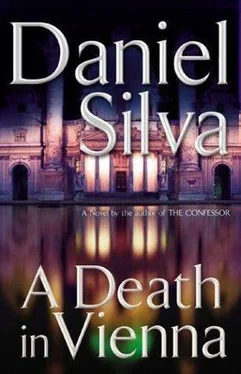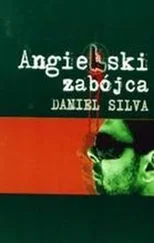“Do you require anything else?”
The Clockmaker reminded Signor Mondiani that he had requested a motorbike.
“Ah yes, the motorino, ” Mondiani said, holding a set of keys aloft. “It’s parked outside the shop. There are two helmets, just as you requested, different colors. I chose black and red. I hope that’s satisfactory.”
The Clockmaker glanced at his watch. Mondiani took the hint and moved things along. On a steno pad, with a chewed pencil, he prepared the invoice.
“The weapon is clean and untraceable,” he said, the pencil scratching across the paper. “I suggest you drop it into the Tiber when you’re finished. The Polizia di Stato will never find it there.”
“And the motorbike?”
Stolen, said Mondiani. “Leave it in a public place with the keys in the ignition-a busy piazza, for example. I’m sure that within a few minutes, it will find a new home.”
Mondiani circled the final figure and turned the pad around so the Clockmaker could see. It was in euros, thank God. The Clockmaker, despite the fact he was a businessman himself, had always loathed making transactions in lire.
“Rather steep, is it not, Signore Mondiani?”
Mondiani shrugged and treated the Clockmaker to another hideous smile. The Clockmaker picked up the silencer and screwed it carefully into the end of the barrel. “This charge here,” the Clockmaker said, tapping the steno pad with the forefinger of his free hand. “What is that for?”
“That is my brokerage fee.” Mondiani managed to say this with a completely straight face.
“You’ve charged me three times as much for the Glock as I would pay in Austria. That, Signor Mondiani, is your brokerage fee.”
Mondiani folded his arms defiantly. “It is the Italian way. Do you want your weapon or not?”
“Yes,” said the Clockmaker, “but at a reasonable price.”
“I’m afraid that’s the going rate in Rome at the moment.”
“For an Italian, or just for foreigners?”
“It might be better if you took your business elsewhere.” Mondiani held out his hand. It was trembling. “Give me the gun, please, and see yourself out.”
The Clockmaker sighed. Perhaps it was better this way. Signor Mondiani, despite the assurances of the man from Vienna, was hardly the type to inspire trust. The Clockmaker, in a swift movement, rammed a cartridge into the Glock and chambered the first round. Signor Mondiani’s hands came up defensively. The shots pierced his palms before striking his face. The Clockmaker, as he slipped out of the office, realized that Mondiani had been honest about at least one thing. The gun, when fired, emitted little more than a whisper.
HE LET HIMSELF out of the shop and locked the door behind him. It was nearly dark now; the dome of the Basilica had receded into the blackening sky. He inserted the key into the ignition of the motorbike and started the engine. A moment later he was speeding down the Via della Conciliazione toward the mud-colored walls of the Castel San Angelo. He sped across the Tiber, then made his way through the narrow streets of Centro Storico, until he came to the Via Giulia.
He parked outside the Cardinal Hotel, removed his helmet, and went into the lobby, then turned to the right and entered a small, catacomblike bar with walls fashioned of ancient Roman granite. He ordered a Coke from the bartender-he was confident he could accomplish this feat without betraying his Austrian-German accent-and carried the drink to a small table adjacent to the passageway between the lobby and the bar. To pass the time, he snacked on pistachio nuts and leafed through a stack of Italian newspapers.
At seven-thirty a man stepped out of the elevator: short dark hair, gray at the temples, very green eyes. He left his room key at the front desk and went into the street.
The Clockmaker finished his Coke, then went outside. He swung his leg over Signor Mondiani’s motorino and started the engine. The black helmet was hanging by its strap from the handlebars. The Clockmaker removed the red helmet from the rear storage compartment and put it on, then placed the black one into the compartment and closed the lid.
He looked up and watched the figure of the green-eyed man retreating steadily into the darkness of the Via Giulia. Then he pulled back on the throttle and eased slowly after him.
THE RESERVATION AT La Carbonara was for four. Gabriel walked to the Piazza Farnese and found Pazner waiting near the French Embassy. They walked to Al Pompière and took a quiet table in the back. Pazner ordered red wine and polenta and handed Gabriel a plain envelope.
“It took some time,” Pazner said, “but eventually they found a reference to Krebs in a report about a Nazi named Aloïs Brunner. Know much about Brunner?”
He was a top aide to Eichmann, Gabriel replied, a deportation expert, highly skilled in the art of herding Jews into ghettos and then to the gas chambers. He’d worked with Eichmann on the deportation of the Austrian Jews. Later in the war, he handled deportations in Salonika and Vichy France.
Pazner, clearly impressed, impaled a piece of polenta. “And after the war he escaped to Syria, where he lived under the name George Fischer and served as a consultant to the regime. For all intents and purposes, the modern Syrian intelligence and security services were built by Aloïs Brunner.”
“Was Krebs working for him?”
“So it would seem. Open the envelope. And, by the way, be sure you treat that report with the respect it deserves. The man who filed it paid a very high price. Take a look at the agent’s code name.”
“MENASHE”WAS THE code name of a legendary Israeli spy named Eli Cohen. Born in Egypt in 1924, Cohen had emigrated to Israel in 1957 and immediately volunteered to work for Israeli intelligence. His psychological testing produced mixed results. The profilers found him highly intelligent and blessed with an extraordinary memory for detail. But they also discovered a dangerous streak of “exaggerated self-importance” and predicted Cohen would take unnecessary risks in the field.
Cohen’s file gathered dust until 1960, when increasing tension along the Syrian border led the men of Israeli intelligence to decide they desperately needed a spy in Damascus. A long search of candidates produced no suitable prospects. Then the search was broadened to include those who had been rejected for other reasons. Cohen’s file was opened once more, and before long, he found himself being prepared for an assignment that would ultimately end in his death.
After six months of intensive training, Cohen, posing as Kamal Amin Thabit, was sent to Argentina to construct his cover story: a successful Syrian businessman who had lived abroad his entire life and wanted only to move to his homeland. He ingratiated himself with the large Syrian expatriate community of Buenos Aires and developed many important friendships, including one with Major Amin al-Hafez, who would one day become the president of Syria.
In January 1962, Cohen moved to Damascus and opened an import-export business. Armed with introductions from the Syrian community in Buenos Aires, he quickly became a popular figure on the Damascus social and political scene, developing friendships with high-level members of the military and the ruling Ba’ath party. Syrian army officers took Cohen on tours of military facilities and even showed him the fortifications on the strategic Golan Heights. When Major al-Hafez became president, there was speculation that “Kamal Amin Thabit” might be in line for a cabinet post, perhaps even the Ministry of Defense.
Syrian intelligence had no idea that the affable Thabit was in reality an Israeli spy who was sending a steady stream of reports to his masters across the border. Urgent reports were sent via coded Morse radio transmissions. Longer and more detailed reports were written in invisible ink, hidden in crates of damascene furniture, and shipped to an Israeli front in Europe. Intelligence provided by Cohen gave Israeli military planners a remarkable window on the political and military situation in Damascus.
Читать дальше












